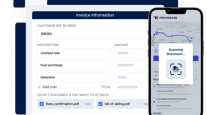Managing Editor, Features and Multimedia
NMFTA Developing API Road Map for LTL Shipment Data

[Stay on top of transportation news: Get TTNews in your inbox.]
The Digital LTL Council, a division of the National Motor Freight Traffic Association, is developing a set of application programming interface standards covering the full life cycle of less-than-truckload shipments, from quote to cash.
Once completed, the downloadable APIs will enable shippers, carriers and third-party logistics providers to perform all functions within the LTL shipment data stream digitally, the council said.
The Digital LTL Council announced its plans to develop an API road map during its June 28 membership meeting.
APIs provide a digital method for multiple computer programs to communicate with each other. The standard API definitions being developed through this effort will streamline interactions among various players in the LTL sector.

Wagner-Wilkins
“API standards are key because they allow everyone in the industry to build APIs one time and use the same API for all their partners, versus taking the time and spending money to build to each partner’s specifications,” said Dolly Wagner-Wilkins, chief technology officer at Worldwide Express. “This enables faster digitization, which in turn greatly reduces errors and improves visibility of pickups, shipments and charges between carriers and shippers.”
The new program will establish nine APIs covering the following processes: rate quotes, electronic bills of lading, pickup requests and pickup visibility, in-transit visibility, preliminary rate charges, financial rate disputes, cargo loss and damage claims, document retrieval, and carrier route guides.
Geoff Muessig, chairman of the Digital LTL Council and chief marketing officer at Pitt Ohio, said LTL carriers already use digital communication effectively to advise shippers and 3PLs when shipment milestones have passed. However, they can further improve efficiency by using that same digital communication when exceptions arise, such as a missed pickup or misrouted shipment.
“These new real-time APIs will allow carriers to communicate shipment and invoice exceptions as they happen, thereby reducing costs and improving service for all parties,” Muessig said.
The API road map effort expands upon an earlier initiative that established industrywide standards for electronic bills of lading, which have been adopted by carriers such as Dayton Freight Lines, Estes Express Lines, Old Dominion Freight Line, Pitt Ohio, R+L Carriers, Roadrunner Transportation, Southeastern Freight Lines and TFI International.
Want more news? Listen to today's daily briefing below or go here for more info:




